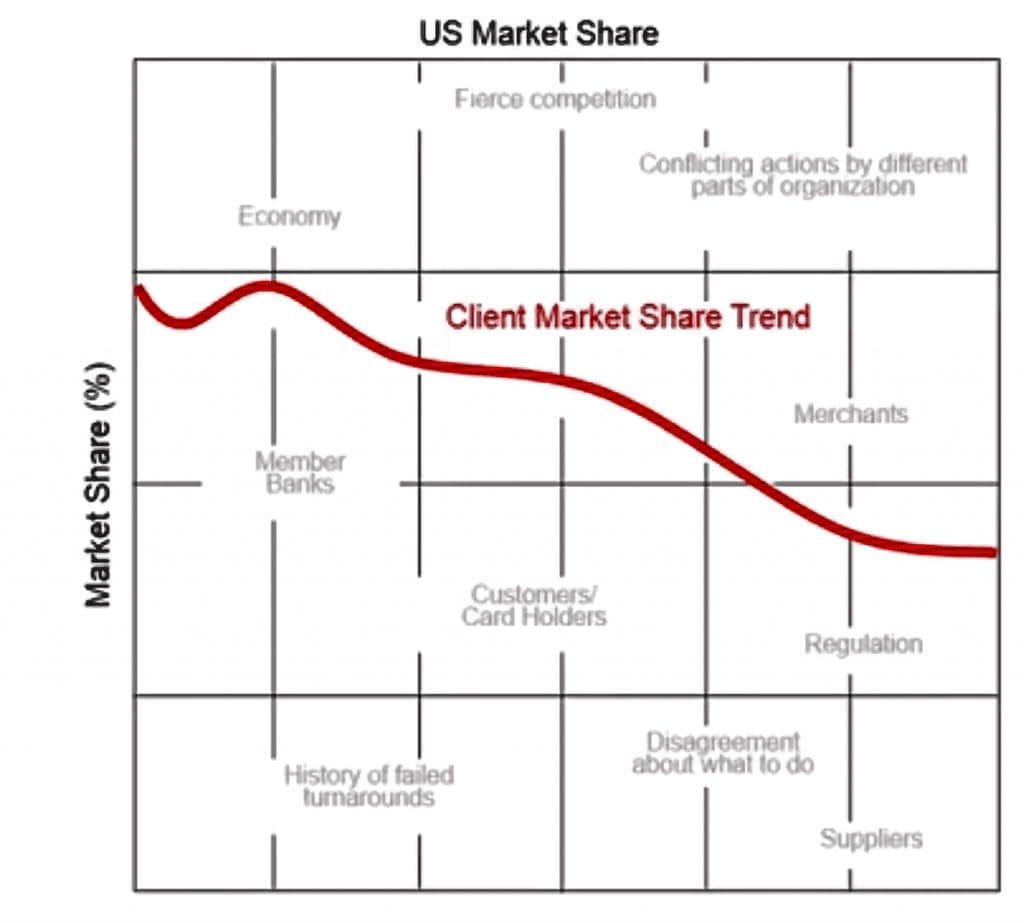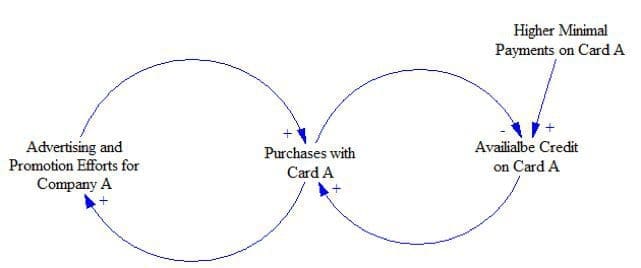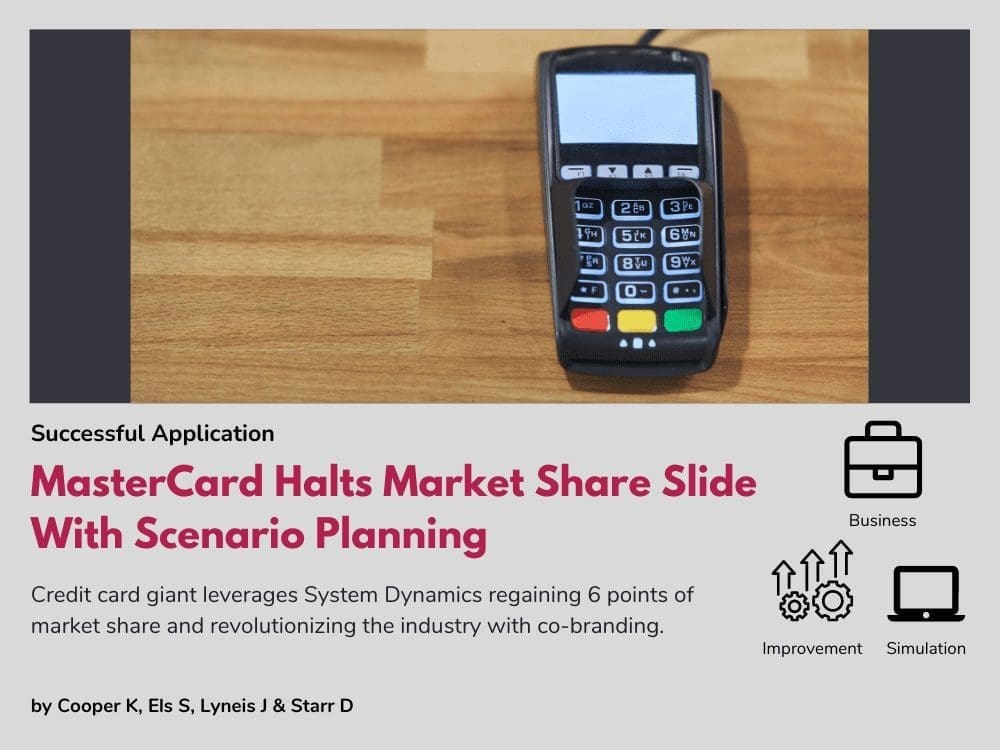MasterCard Halts Market Share Slide With Scenario Planning
The Problem
MasterCard, a major credit card company, once held a dominant market position US Market Share with only one primary competitor, Visa. They woke up one day and realized that, after six years of steady decline in revenues and market share, they had lost their leadership position. The company was stymied. Everyone was blaming each other. The erosion continued despite every effort to turn things around. Conventional wisdom, based on past experience, was not working. It was pretty desperate, nobody knew what to do, and it was feared that they would be out of business in the next five years if they couldn’t turn the “death spiral” around. Despite multiple initiatives to slow or reverse the decline, nothing seemed to work. Our work began with a more limited focus, but soon our objective became finding a solution to reverse the market share decline. It became clear, given the changes in the marketplace, that a new way of understanding the forces at play was necessary.

The Solution
The company called in the System Dynamics group of PA consulting as part of a larger project to change the company’s fortunes. System Dynamics (SD) and PA consulting were chosen because of their ability to look at the problem in a whole new way: people within in the company were thwarting each other’s efforts, and a more holistic approach for the organization was necessary. SD provided the necessary perspective by looking at the system as a whole, without losing crucial details.
Among the early modeling insights, was a simple recognition of the perilous situation in which MasterCard found themselves. The fact was that the company’s clients, credit card issuers, tended to focus all of their marketing efforts on the market leader, while ignoring the runner-up. In this case, when Visa was king, clients only promoted Visa’s product to the detriment of MasterCard. This was a case of a common systems trap called “Success to the Successful” and, if left unchecked, would surely have led to the demise of the less successful entity, MasterCard.
MasterCard also learned that there was a limit on spending due to minimal payments. Customers would not use the cards to the full advantage if they were not being paid off. Counter-intuitively, the best observed solution for this problem was to create a higher minimum payment, to allow for increased monthly spending.

We designed, built and tested a model of the US credit card industry and market–the cardholders, the choices they made using different cards, the businesses that accepted the cards. The model simulated MasterCard performance and that of each of the main competitors-Visa, Amex, Discover.
We tested ideas that came from all parts of the organization, but none had a significant and lasting impact. At one point they told us, “Just go experiment and let us know what you can find that WILL make a difference.” After several analyses, we identified four factors that when COMBINED would have that significant, lasting market share benefit being sought. A few discussions quickly identified “co-branding” (though we didn’t know what to call it then) as a strategy that would “pull all 4 levers”. We just described it as partnering with consumer-facing companies.
The outcome
PA consulting worked to collect real world experience, expert interviews, quantitative and qualitative data, and cultural factors. The information was cross checked, and at first, client focused. But a unique benefit of SD is its ability to scale upwards to encompass the entire market and capture the inherent complexities within the system. This model was scalable and could be moved from department to department to test a wide variety of initiatives. Hundreds of factors could be tested within the model’s nonlinear and time delayed system, to find the true leverage points which would allow MasterCard to regain and improve their market share. Consequently it was discovered that efforts such as increased value added assurance and increased issuer preference held the most value while conventional solutions like increased advertising held little leverage. This led MasterCard to be the first to market with the technique called co-branding, a partnership between a credit card brand and company, which allowed them to regain 6 points of market share.
Co-branding revolutionized the industry. Today, if you have a credit card, it is likely co-branded–the GM MasterCard, the Target MasterCard… Co-branding had the advantage of being a win-win-win… a win for the consumers, as the “points” gained by consumers provided noticeable discounts on their purchases…a win for the co-branders, who achieved higher customer loyalty as a result…and a big win for MasterCard, gaining almost exactly the market share and the timing predicted by the modeling. They hit the ground running and it was years before Visa and others could mount a similar set of alliances.To the MasterCard member banks the increase was worth billions in relative market share. Since then, co-branded cards have taken off in the United States and have redefined profits within the industry.
For MasterCard, System Dynamics changed not only the way the company saw itself, its competitors and its products, but it also helped drive the creation of an entirely new product line. MasterCard was able to efficiently understand their strategic resources and move on to a new field of growth by recognizing the key leverage points within their own system, identified thanks to the work done by PA consulting.
“In the end, everyone took credit for the work.”―Sharon Els
| Modelers | Kenneth Cooper, Sharon Els, Jim Lyneis, David Starr |
|---|---|
| The Official Website | For added information, or with any questions, see CooperSDNetwork.com, or contact Ken via email: Ken.Cooper@CooperSD.com |
MasterCard Case: Part 1
(Narrated by Ken Cooper) 9:47 minutes
MasterCard Case Part 2 – The Back Story
(Narrated by Ken Cooper) 3:07 minutes
System Dynamics XMILE Webinars
On November 19, 2013 David Starr from Cooper Human Systems, and Sharon Els from PA Consulting Group presented their work in a webinar hosted by Steve Adler from IBM, and Karim Chichakly from isee systems.
This webinar was the third in the Big Data, System Dynamics, and XMILE webinar series jointly sponsored by IBM, isee systems and the OASIS XMILE Technical Committee. The series was showcase exemplar applications of System Dynamics in the areas of environment, business, health care, and public policy. (Nov 2013)
OTHER SUCCESSFUL APPLICATIONS
Solving Bottlenecks in Dairy Production Facilities with System Dynamics
Solving Bottlenecks in Dairy Production Facilities with System Dynamics EXECUTIVE Summary FrieslandCampina faced potential bottlenecks in production due to the merging of two factories. They hired SD&Co which employed system dynamics simulation models to predict...
A Design Value Calculator: A System Dynamics Boardgame
A Design Value Calculator: A System Dynamics Boardgame EXECUTIVE Summary Product design is a specific form of complex innovation that touches all areas of an organization’s management. While entrepreneurs recognise the value of design, they often tend to focus...
The World Bank Uses System Dynamics to Identify Root Causes of Poverty
The World Bank Uses System Dynamics to Identify Root Causes of Poverty EXECUTIVE Summary Madagascar has one of the highest poverty rates in the world. In 2022, an astonishingly three out of every four people in Madagascar lived below the poverty line. Poverty has...
Upcoming Events

MIT System Dynamics Seminar | Approaches to Encouraging Health Exchange Participation
You are invited to attend the System Dynamics Seminar being held on Friday, April 26th from 12:30-2:00pm EST in the Jay W. Forrester conference room, E62-450, or via Zoom: https://mit.zoom.us/j/94114971874 (Password: SDSP24). Our guest speaker will be Soheil Ghili...
Recent Posts
Society Governance Updates
Society Governance Updates Welcome, Allyson! New President Allyson Beall King joined the Policy Council as our 2024 President. Her primary role is as director of the Washington State University School of the Environment, which focuses on regional ecologies and our...
Call for Presenters: Seminar Series
Call for Presenters: Seminar Series We at the System Dynamics Society are continually seeking vibrant and knowledgeable presenters for our ongoing Seminar Series. As we unfold the calendar, there’s always a place for more insights, experiences, and expertise to enrich...
Honoring Excellence: A Glimpse into the Awards of the International System Dynamics Conference
Honoring Excellence: A Glimpse into the Awards of the International System Dynamics Conference The International System Dynamics Conference brings together experts, practitioners, and students to exchange ideas, showcase real-world applications, and celebrate...
Join us
OTHER SUCCESSFUL APPLICATIONS
Solving Bottlenecks in Dairy Production Facilities with System Dynamics
Solving Bottlenecks in Dairy Production Facilities with System Dynamics EXECUTIVE Summary FrieslandCampina faced potential bottlenecks in production due to the merging of two factories. They hired SD&Co which employed system dynamics simulation models to predict...
A Design Value Calculator: A System Dynamics Boardgame
A Design Value Calculator: A System Dynamics Boardgame EXECUTIVE Summary Product design is a specific form of complex innovation that touches all areas of an organization’s management. While entrepreneurs recognise the value of design, they often tend to focus...
The World Bank Uses System Dynamics to Identify Root Causes of Poverty
The World Bank Uses System Dynamics to Identify Root Causes of Poverty EXECUTIVE Summary Madagascar has one of the highest poverty rates in the world. In 2022, an astonishingly three out of every four people in Madagascar lived below the poverty line. Poverty has...
Recent Posts
Society Governance Updates
Society Governance Updates Welcome, Allyson! New President Allyson Beall King joined the Policy Council as our 2024 President. Her primary role is as director of the Washington State University School of the Environment, which focuses on regional ecologies and our...
Call for Presenters: Seminar Series
Call for Presenters: Seminar Series We at the System Dynamics Society are continually seeking vibrant and knowledgeable presenters for our ongoing Seminar Series. As we unfold the calendar, there’s always a place for more insights, experiences, and expertise to enrich...
Honoring Excellence: A Glimpse into the Awards of the International System Dynamics Conference
Honoring Excellence: A Glimpse into the Awards of the International System Dynamics Conference The International System Dynamics Conference brings together experts, practitioners, and students to exchange ideas, showcase real-world applications, and celebrate...
Upcoming Events

MIT System Dynamics Seminar | Approaches to Encouraging Health Exchange Participation
You are invited to attend the System Dynamics Seminar being held on Friday, April 26th from 12:30-2:00pm EST in the Jay W. Forrester conference room, E62-450, or via Zoom: https://mit.zoom.us/j/94114971874 (Password: SDSP24). Our guest speaker will be Soheil Ghili...


